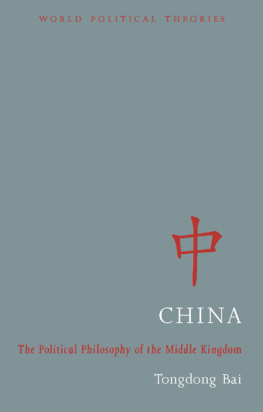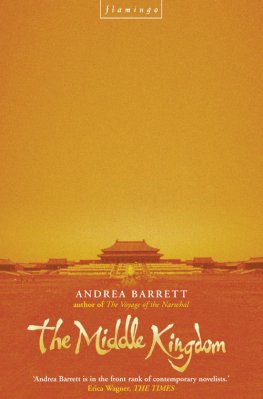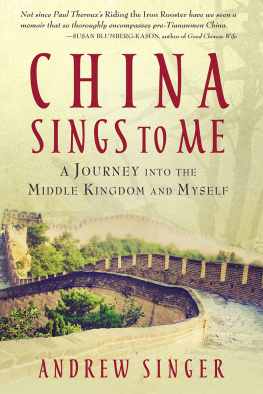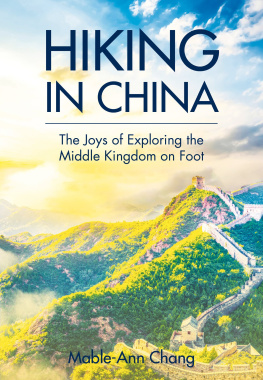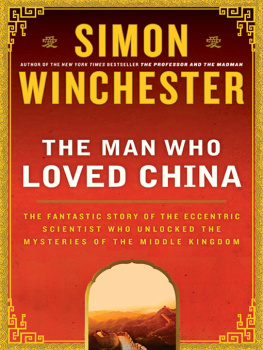Tongdong Bai - China: The Political Philosophy of the Middle Kingdom
Here you can read online Tongdong Bai - China: The Political Philosophy of the Middle Kingdom full text of the book (entire story) in english for free. Download pdf and epub, get meaning, cover and reviews about this ebook. year: 2012, publisher: Zed Books, genre: Politics. Description of the work, (preface) as well as reviews are available. Best literature library LitArk.com created for fans of good reading and offers a wide selection of genres:
Romance novel
Science fiction
Adventure
Detective
Science
History
Home and family
Prose
Art
Politics
Computer
Non-fiction
Religion
Business
Children
Humor
Choose a favorite category and find really read worthwhile books. Enjoy immersion in the world of imagination, feel the emotions of the characters or learn something new for yourself, make an fascinating discovery.
- Book:China: The Political Philosophy of the Middle Kingdom
- Author:
- Publisher:Zed Books
- Genre:
- Year:2012
- Rating:4 / 5
- Favourites:Add to favourites
- Your mark:
- 80
- 1
- 2
- 3
- 4
- 5
China: The Political Philosophy of the Middle Kingdom: summary, description and annotation
We offer to read an annotation, description, summary or preface (depends on what the author of the book "China: The Political Philosophy of the Middle Kingdom" wrote himself). If you haven't found the necessary information about the book — write in the comments, we will try to find it.
Tongdong Bai: author's other books
Who wrote China: The Political Philosophy of the Middle Kingdom? Find out the surname, the name of the author of the book and a list of all author's works by series.
China: The Political Philosophy of the Middle Kingdom — read online for free the complete book (whole text) full work
Below is the text of the book, divided by pages. System saving the place of the last page read, allows you to conveniently read the book "China: The Political Philosophy of the Middle Kingdom" online for free, without having to search again every time where you left off. Put a bookmark, and you can go to the page where you finished reading at any time.
Font size:
Interval:
Bookmark:

WORLD POLITICAL THEORIES
World Political Theories aims to change the way we think about non-Western political ideas. Each book in the series looks at a particular region or country, and how thinking about politics has developed there. In doing so, the books ask how universal political theory actually is, and to what extent place makes a difference. Through looking at the historical development of political thinking, the books provide important context for understanding contemporary politics, whilst introducing fresh ideas and challenges to conventional political theory.
TITLES ALREADY PUBLISHED
Patrick Chabal, Africa: The Politics of Suffering and Smiling Shahrough Akhavi, The Middle East: The Politics of the Sacred and Secular
FORTHCOMING TITLES
Gurpreet Mahajan, India: Cross-Cultural Conversations
ABOUT THE AUTHOR
T ONGDONG B AI is a professor at Fudan University in Shanghai. He holds a BS degree (nuclear physics) and an MA degree (philosophy of science) from Peking University, and a PhD degree (philosophy) from Boston University. He was an associate professor of philosophy at Xavier University in Cincinnati. His most recent books are: A New Mission of an Old State: Classical Confucian Political Philosophy in a Contemporary and Comparative Context and Tension of Reality: Einstein, Bohr, and Pauli in the EPR Debates (both in Chinese). His research is focused on the contemporary relevance of traditional Chinese political philosophy.
CHINA
The political philosophy of the Middle Kingdom
TONGDONG BAI
Zed Books
LONDON & NEW YORK
China: The Political Philosophy of the Middle Kingdom was first published in 2012 by Zed Books Ltd, 7 Cynthia Street, London NI 9 JF , UK and Room 400, 175 Fifth Avenue, New York, NY 10010, USA
This ebook edition was first published in 2012.
www.zedbooks.co.uk
Copyright Tongdong Bai 2012.
The right of Tongdong Bai to be identified as the author of this work has been asserted by him in accordance with the Copyright, Designs and Patents Act, 1988
Designed and typeset in Monotype Joanna
by illuminati, Grosmont
Cover designed by Lucy Morton @ illuminati
Index by John Barker
All rights reserved. No part of this publication may be reproduced, stored in a retrieval system or transmitted in any form or by any means, electronic, mechanical, photocopying or otherwise, without the prior permission of Zed Books Ltd.
A catalogue record for this book is available from the British Library Library of Congress Cataloging in Publication Data available
ISBN 978 1 78032 078 6
Acknowledgements
I would like to thank Zed Books for publishing this fascinating series of world political theories and for asking me to write this short book on traditional Chinese political philosophy. I am particularly grateful to my editor, Ken Barlow, for his kind support, patience and helpful comments.
Many people have been instrumental in the formation of my outlook on traditional Chinese political philosophy; they are too numerous to thank here. However, special thanks are due to Daniel Bell, for his never-ending support for my work, for offering me his insights on many political issues, and for his comments on an earlier draft of this book.
Some of the material in this book is based on previously published work ( is now being considered for publication as well. I thank all the journals and presses that have published my works for their support. I have already expressed gratitude to those who offered criticisms of these works, so will not repeat these acknowledgements here.
The research for this book was supported by the Program for Professor of Special Appointment (Eastern Scholar) at Shanghai Institutions of Higher Learning, the New Century Excellent Talents in University grant, Shanghai Educational Development Foundation (Shuguang Project), the Pujiang Talents grant from the Shanghai government, the Shanghai Philosophy and Social Sciences Projects, and by research grants from Fudan University (the Guanghua program, 985 Project 2011 RWXKZD009 , 985 Project 2011 RWXKZD010 and others). I am grateful for their support.
Introduction
Message from China
China is rising, but both Chinese and non-Chinese are wondering what message this rise offers. What do the Chinese want from the world? What can they give to the world? Many of those non-Chinese who perceive Chinas rise as a threat and those Chinese who hold grievances over the wrongs that the Western and Japanese colonial powers inflicted upon China in the late nineteenth and twentieth centuries believe that the Chinese want to revive the countrys power and then take revenge for those wrongs. If this is the case, the world will be in a big trouble. Others believe that the rise of China may offer alternatives to the received economic and political models, which have been shown to be increasingly problematic. Therefore the message of the rise of China has become an issue that haunts not only academic researchers but also concerned citizens the world over.
This book is intended to address these concerns by examining the traditional political thought of China. Before I explain how the book sets out to address these concerns, let me make clear what this book is not . It does not answer directly empirical questions such as Why has China risen again in todays world? and Does the rise of China offer a model for economics and politics? These issues are important, but they are beyond my competence, as a philosopher. Indeed, if history teaches us anything, it counsels that a measure of humility is required in dealing with such questions.
Let us consider an example. In , Max Weber, one of the most important sociologists and influential thinkers of the twentieth century, considers the Protestant ethic one of the factors that promotes capitalism; the implication (drawn by many East Asians) seems to be that Confucianism is, then, a reason for the lack of indigenous capitalistic development in East Asia. In consequence, the Westernizers in East Asia have tried to rid East Asia of Confucianism so as to embrace capitalism and modernity. However, then East Asia rose while apparently still preserving many of its values, a fact that seems to debunk the allegedly Weberian thesis. As a result, it can be argued that Confucianism can actually promote the development of capitalism. This thesis carries its own risk, unfortunately. Indeed, after the Southeast Asian financial crisis, advocates of the Asian Model suddenly became quiet.
There is a more dramatic example. During the height of Japans apparently unstoppable rise to economic dominance, Harvard professor Ezra Vogel published Japan as Number One: Lessons for America (). Nowadays, however, the USA is more likely to go to Japan for lessons not in development, but in how to avoid stagnation.
The general historical lesson is that, first, we should be circumspect in our drawing of empirical conclusions from a vastly complicated world; second, if a culture takes a free ride from the economic rise, it will take a free fall when the economy goes bust.
It is now a popular practice to draw lessons from Chinas economic rise that may be useful to the world, just as people liked to do from Japans economic rise a few decades back. This exercise carries risks. For example, many argue that Confucianism has played an important role in the rise of China and the rest of East Asia. They take it for granted that Confucian values are still dominant in the region. But this is not self-evidently the case, especially in contemporary China.
First, other influential values played their part in traditional Chinese culture, such as those of Daoism, Buddhism and Legalism. Consider the common impression that Chinese culture historically has disparaged commerce. Taking it as the core of this culture, people tend to hold Confucianism responsible for this undervaluation. However, as this book will show, early Confucians were not against commerce and money-making. If blame lies anywhere, it is with some Daoists and Legalists, who did indeed hold a rather low opinion of commerce.
Next pageFont size:
Interval:
Bookmark:
Similar books «China: The Political Philosophy of the Middle Kingdom»
Look at similar books to China: The Political Philosophy of the Middle Kingdom. We have selected literature similar in name and meaning in the hope of providing readers with more options to find new, interesting, not yet read works.
Discussion, reviews of the book China: The Political Philosophy of the Middle Kingdom and just readers' own opinions. Leave your comments, write what you think about the work, its meaning or the main characters. Specify what exactly you liked and what you didn't like, and why you think so.

